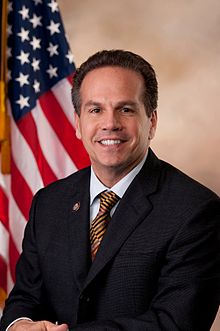|
Which tax system do Americans want?The FairTax was the top choice in our poll for the second consecutive year ... but that's not the end of the story. Check out what each of the choices would mean for taxpayers and how many people voted for each reform onGovernment Bytes!
The Bill: S. 2342, the Stop Subsidizing Childhood Obesity Act Savings Per Year: $500 million (one-year cost)
A 2012 report from the Federal Trade Commission (FTC) found that the food industry spent $2.1 billion on youth marketing efforts in 2006; $1.29 billion, or 76 percent of that amount, funded advertising for fast food, carbonated beverages, and breakfast cereals. Under current tax laws, fast food restaurants – along with many other types of businesses – are allowed to deduct certain marketing and promotional expenses from their taxes. Some lawmakers are concerned that those deductions essentially subsidize foods that contribute to obesity in children and teens. In 2012, former Congressman Dennis Kucinich (D-OH) introduced legislation that would prevent businesses from claiming deductions on promotional efforts for foods of “poor nutritional quality,” as determined by the FTC and the Department of Health and Human Services (HHS). The goal was to reduce consumption of fast food by children and adolescents, who Rep. Kucinich claimed were especially influenced by “sophisticated, targeting” marketing efforts from the food industry. Rep. Kucinich’s legislation has been reintroduced in the 113th Congress bySenator Richard Blumenthal (D-CT) as the Stop Subsidizing Childhood Obesity Act. S. 2342 would prohibit deductions for marketing of foods that don’t meet nutritional standards set by FTC and HHS. The legislation would authorize additional expenditures for the U.S. Department of Agriculture’s (USDA) Fresh Fruit and Vegetable program, equal to the amount of increased revenue in the absence of fast food marketing deductions. The Fresh Fruit and Vegetable program offers grants to schools to offer more fresh, local produce for students. The program, which was initially established as a $10 million pilot program in 2002, offers participating elementary schools between $50-75 per student and received about$205 million in funding in FY 2014. Congresswoman Rosa DeLauro (D-CT)introduced similar legislation in the House as H.R. 2831, but her bill did not include the additional USDA funding provision. According to Senator Blumenthal’s office, eliminating the tax deductions in question could raise about $500 million per year, which would then be spent in addition to any funds already appropriated for the USDA’s Fresh Fruit and Vegetable program.
The Bill: H.R. 4677/S. 2339, the State Exchange Accountability Act Savings Per Year: $75 million ($373 million over five years)
The federal exchange has seen widespread and systemic failures at various phases of implementation, as estimates from the Government Accountability Office pin the total cost thus far at $840 million. Initial estimates had the costs of the exchanges at $56 million in 2011. However, the state-based exchanges have not been trouble-free either. Despite periodic reviews and receiving hundreds of millions of dollars in taxpayer-funded subsidies to assist them, four states have already decided to scrap their websites and start over. Massachusetts, Maryland, Oregon, and Nevada have encountered so many technical and security issues in implementing their exchanges that they have either decided to opt into the federal system or create new websites altogether. Oregon and Nevada will be joining the Healthcare.gov site; Maryland has finalized a $50 million contract for new software; and Massachusetts is expected to confirm a deal for privately produced software in the coming weeks.
Congressman Tom Reed (R-NY) and Senator John Barrasso (R-WY) introduced measures in a legislative attempt to recoup some of those funds. Under the State Exchange Accountability Act, states that received federal grant money to establish exchanges that were in operation at any point in 2014, only to abandon those websites later, would be required to reimburse the government for those amounts within ten years. NTUF assumes that if the legislation were signed into law, the $746 million owed by the four states with failed exchanges would repay those amounts in equal installments over the next decade, about $75 million per year.
The Bill: H.R. 5095, a bill to mandate all Members, Delegates, and the Resident Commissioner of the House of Representatives to complete annual ethics training conducted by the Committee on Ethics Cost Per Year: “No Cost” – No New Funding
Similar training is also offered in the Senate, and is required of both Members and staffers alike. Topics covered inslideshows available online include how to determine if gifts are acceptable, travel reimbursement procedures, and how to recognize scenarios that could create conflicts of interest.
NTUF does not anticipate the bill’s provisions to require significant additional funding, since it would presumably utilize existing training materials and resources for other employees in the House.
|











